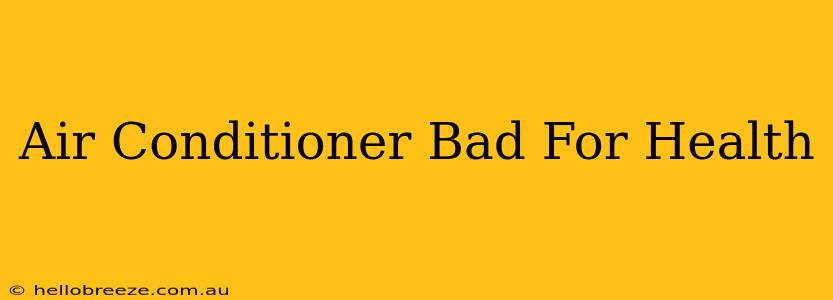Air conditioners are a ubiquitous part of modern life, offering respite from scorching temperatures. However, while they provide comfort, they also present potential health risks if not used and maintained properly. This article delves into the potential negative health effects of air conditioners and provides practical tips to mitigate those risks.
How Air Conditioners Can Impact Your Health
While the immediate benefit of an air conditioner is a cool and comfortable environment, several factors can negatively affect your health:
1. Dry Air and Respiratory Issues:
One of the most significant drawbacks of air conditioning is its tendency to dry out the air. Dry air can irritate the mucous membranes in your nose and throat, leading to:
- Dry cough: The lack of moisture can trigger a persistent cough.
- Sore throat: Dry air can inflame the throat, causing discomfort and pain.
- Sinus infections: Dry air can thicken mucus, making it difficult to drain, increasing the risk of sinus infections.
- Exacerbation of respiratory conditions: Individuals with asthma, allergies, or other respiratory conditions may experience worsened symptoms due to dry air.
2. Legionnaires' Disease:
Legionnaires' disease is a severe form of pneumonia caused by bacteria (Legionella) that can thrive in water systems, including those found in air conditioners. Improper maintenance and cleaning of air conditioning units can lead to the spread of these bacteria. Symptoms include high fever, cough, shortness of breath, and muscle aches.
3. Sick Building Syndrome:
Poorly maintained air conditioning systems can contribute to Sick Building Syndrome (SBS). SBS is characterized by a cluster of symptoms, such as headaches, fatigue, eye irritation, and respiratory problems, experienced by occupants of a building. These symptoms are often linked to poor indoor air quality, which can be exacerbated by inadequately maintained AC units.
4. Mold Growth:
Air conditioners, especially those in humid climates, can provide ideal conditions for mold growth. Mold spores can circulate through the air, causing allergic reactions and respiratory problems in sensitive individuals.
5. Temperature Fluctuations and Illness:
Rapid shifts between hot and cold temperatures, as experienced when frequently entering and exiting air-conditioned spaces, can weaken the immune system, making you more susceptible to illness.
Minimizing the Health Risks of Air Conditioning
While the risks associated with air conditioning are real, they are largely preventable through proper use and maintenance:
- Maintain Proper Humidity Levels: Use a humidifier to add moisture to the air, particularly during dry seasons.
- Regular Air Conditioner Maintenance: Schedule regular professional cleaning and maintenance of your air conditioning unit to prevent the buildup of bacteria, mold, and other contaminants. This includes cleaning or replacing filters regularly.
- Improve Ventilation: Ensure adequate ventilation in your home or office by opening windows periodically to allow for fresh air circulation.
- Avoid Extreme Temperature Differences: Don't set the thermostat to extremely low temperatures. A moderate temperature difference between indoor and outdoor environments is healthier.
- Regular Air Filter Changes: Change your air conditioner's filter every month or two, or as recommended by the manufacturer.
Conclusion: Enjoy the Cool Air Responsibly
Air conditioning offers undeniable benefits, but it's crucial to be aware of its potential health consequences. By taking proactive steps to maintain your air conditioner and address potential issues, you can significantly reduce the risks and enjoy a cool, comfortable, and healthy environment. Remember, prevention is key to avoiding the negative health effects of air conditioning.

